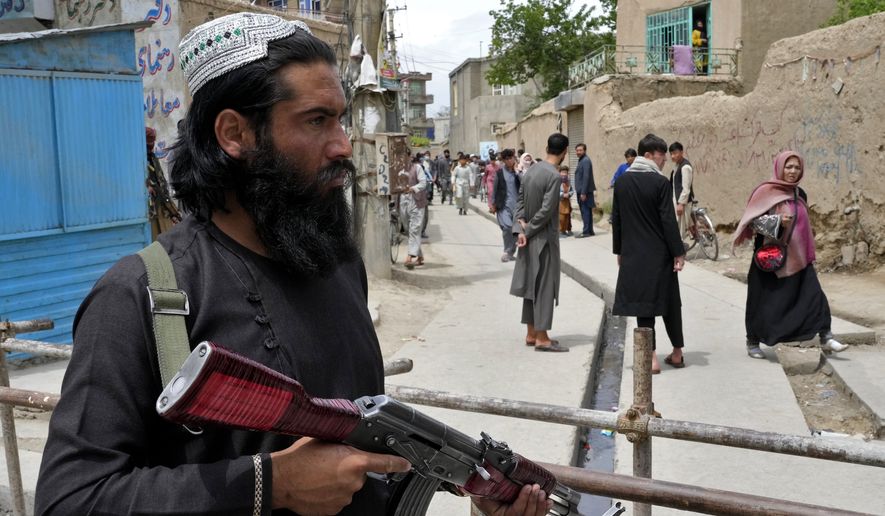Religious oppression in Afghanistan, China, Nigeria, Nicaragua and Sri Lanka — among dozens of other nations — took center stage Monday as the U.S. Commission on International Religious Freedom released its 2023 Annual Report, which called on the State Department to acknowledge these human rights violations publicly.
The Taliban’s repression of Shia Muslims and members of non-Muslim faiths, plus “disastrous, sweeping and repressive policies” against women and girls in Afghanistan, means Secretary of State Antony J. Blinken should designate Afghanistan as a country of particular concern on its annual watch list of human rights violators.
The department has labeled the Taliban as an entity of particular concern, a term it applies to groups such as Al-Shabaab, Boko Haram, Hayat Tahrir al-Sham, the Houthis and ISIS-Sahel.
A State Department spokesperson told The Washington Times via email that while USCIRF was “established to provide policy recommendations to the President, Secretary of State, and Congress,” the panel “is not part of the State Department or the Executive Branch.”
The USCIRF report’s recommendations, the spokesperson said, “overlap to some extent with the State Department’s list of Countries of Particular Concern (CPCs), Special Watch List (SWL) countries, and Entities of Particular Concern (EPCs),” adding “USCIRF’s list reflects the concerns and views of the independent Commission.”
In China, the Communist Party’s genocide against Uyghur Muslims and crackdowns on Tibetan Buddhists and independent Christian churches, Falun Gong practitioners and the Church of Almighty God drew particular attention from the independent commission.
Nigeria, the most populous nation in Africa, continues to face Muslim-Christian strife, with Christians often the targets of Boko Haram and other groups. Former Rep. Frank Wolf is a member of the commission and said Mr. Blinken should return Nigeria to the CPC list and appoint a special envoy to monitor the religious freedom situation there.
“Nigeria is the most dangerous country in the world for Christians,” said Mr. Wolf, who was a Republican congressman from Virginia.
Nicaragua should also be designated a country of particular concern, the commission said. The Ortega regime there “has sharply increased its persecution of the Catholic Church,” the report said, “by imprisoning clergy, shuttering church-affiliated organizations and prohibiting Catholic rituals.”
Mr. Wolf said, “They’ve been targeting the clergy. They imprisoned Bishop [Rolando] Alvarez. They even kicked out Mother Teresa’s group, the Missionaries of Charity.”
According to USCIRF Commissioner Stephen Schneck, religious liberty in Sri Lanka has “taken a horrible turn,” leading to a call for Mr. Blinken to place the Indian Ocean nation on the State Department’s special watch list of religious freedom violators.
“In particular, we see the situation for Hindus and for Muslims in Sri Lanka to be growing increasingly precarious,” Mr. Schneck said, adding, “We’re seeing the imprisonment and harassment of religious leaders of really all non-Buddhist religious leaders in the country.”
Iran was also called out for its intensifying repression of women protesting the regime’s strict rules on wearing the hijab, or head scarf, in public. Demonstrations swept the nation, which is ruled by Islamic mullahs, after the death in custody of Mahsa Amini in September. The regime also harassed members of the Yarsan faith, a Kurdish-based sect, as well as Sunni Muslims and Christians.
Cuba’s religious freedom situation also deteriorated in 2022, USCIRF said, noting persecution of unregistered religious groups — and those conducting “unsanctioned religious activity” — increased last year. Two Protestant pastors were exiled, while the Rev. David Pantaleon, a Catholic priest and head of the Cuban branch of the Society of Jesus, had his residence permit renewal declined after he advocated for political prisoners and the Jesuits’ “critical position toward the regime,” the panel reported.
“Every country named in USCIRF’s 2023 Annual Report is watching to see how the United States will respond to those [gross] violations of human rights,” said Nury Turkel, USCIRF chairman, who spoke along with the other commission members during a video briefing Monday morning.
According to Rabbi Abraham Cooper, the panel’s vice chairman, “The scope and scale of the violations this report documents are nothing less than disheartening. But for us at USCIRF, they drive and inspire a determination to unflinchingly advocate for the essential right of religious freedom for every person in every corner of the globe.”
A USCIRF commissioner said the group is also concerned about efforts to control what people say about religion through the legal process.
Commissioner David Curry told the briefing, “Governments around the world are maintaining laws, which are based on religion, which are coercive in nature. Blasphemy laws are primarily the ones that jump to mind.”
Mr. Curry said, “You could see it in many regions and countries around the world, including Europe. These blasphemy laws are meant to give a particular angle on a specific faith and negate the needs of other minorities, whether they be religious minorities or other minorities within that particular country.”
• Mark A. Kellner can be reached at mkellner@washingtontimes.com.




Please read our comment policy before commenting.